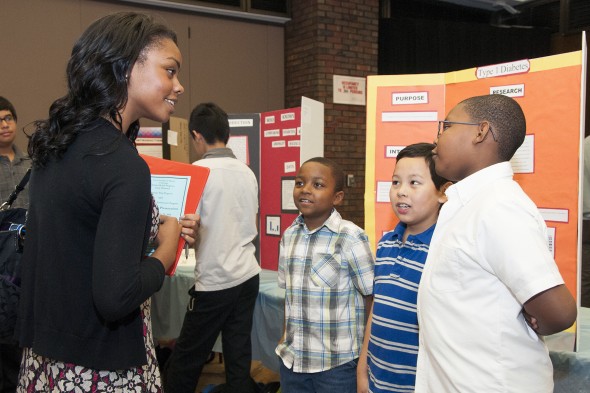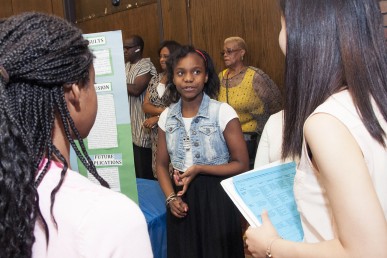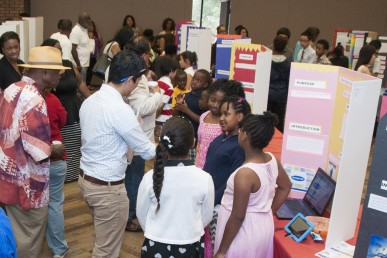Early Outreach summer prep puts students ahead of the game

Stephen Liang, Ethan Wong and Manuel French make their presentation to judge Jocelyn Reaves at the science fair for the Early Outreach program. It’s the 35th year for the summer program and Reaves, a graduate student at Boston University, is an Early Outreach graduate herself. Photo: Joshua Clark/UIC Photo Services
If some of the students on campus this summer looked a little young for college, just wait.
The first- through 12th-graders were enrolled in UIC’s Early Outreach Summer Prep and Health Sciences Enrichment Program. The six-week academic summer program develops students’ skills in science and research, preparing them for college and careers in health care.
“Fewer than 50 percent of students within a 25 mile radius of UIC are ready for college when they graduate from high school,” said Joy Valentine, director of the Early Outreach Program, part of UIC’s Urban Health Program.
“Our summer programs, now in their 35th year, provide an academic enrichment experience for students with health sciences and research at its core.”

Students discuss their research at the Early Outreach science fair. This year’s theme was diabetes. Photo: Joshua Clark/UIC Photo Services
The students spend their mornings on math, science and language arts, then afternoons on computer graphics, coding, crafts, swimming and other activities. For students getting ready to apply to college, there’s ACT preparation.
Each year the program has a different health sciences theme. This year’s theme: diabetes.
“Each student conducts research throughout the summer on their topic, and we pick topics that come up when we talk about health disparities,” said Vernita Lewis, assistant director for the Early Outreach Program. “At the end of the fifth week of the program, they begin preparing their presentations for the science fair.”
About 120 students showed their research to judges at this year’s fair July 29 in Student Center West.
Emily Diaz (seventh grade, St. John’s Lutheran School), Arrington Mims (sixth grade, Lenart Elementary Gifted Center) and Marilyn Akoto (sixth grade, Alcott College Prep) did a presentation on the effects of untreated diabetes. All three have family members with the disease.
Another group, all third-graders — Ethan Wong and Stephen Liang (Skinner West), Manuel French (STEM Magnet Academy) and Tristan Chin (Drummond Elementary) — researched the effects of diabetes on the body.
Manuel said his mother has type 2 diabetes. “She learned about starch and pasta being bad for her,” he said, explaining that starch causes a spike in blood glucose that can be dangerous.

The Urban Health Program’s summer Early Outreach prepares first- through 12th-graders for college and future careers in health care. Photo: Joshua Clark/UIC Photo Services
For many of the students, it’s not their first time in the Early Outreach Program. “We have lots of students who come back year after year,” Lewis said.
Jocelyn Reaves, a graduate student at Boston University’s School of Public Health and an Early Outreach Program graduate herself, returned this summer to teach cellular biology to the sixth- through eighth-graders.
“A lot of the concepts and facts they are learning here aren’t being taught in many high schools,” Reaves said.
“This program helps the students stay ahead of the game, academically.”
Students must apply to the Early Outreach Program. They are selected based on criteria that include academic test scores and an essay. Scholarships are available to assist with the $1,000 tuition.
